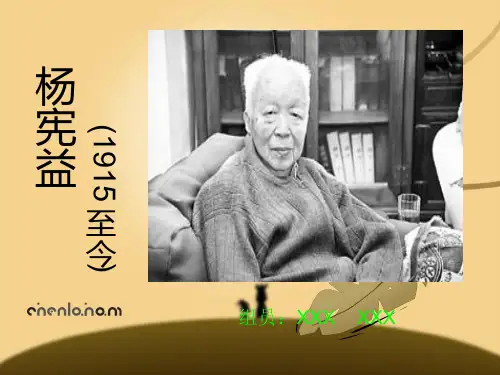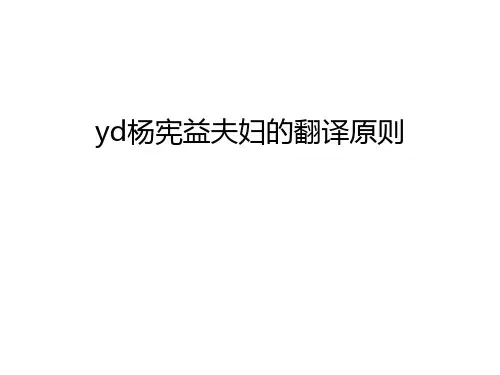最新翻译大家——杨宪益培训资料
- 格式:ppt
- 大小:130.00 KB
- 文档页数:15
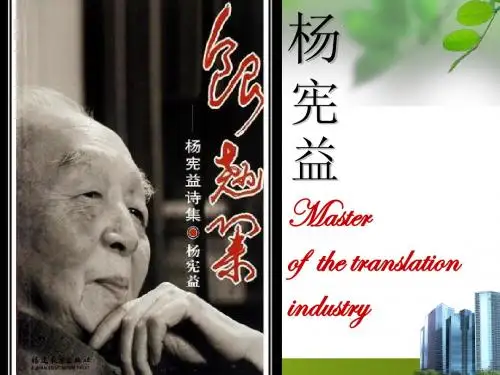
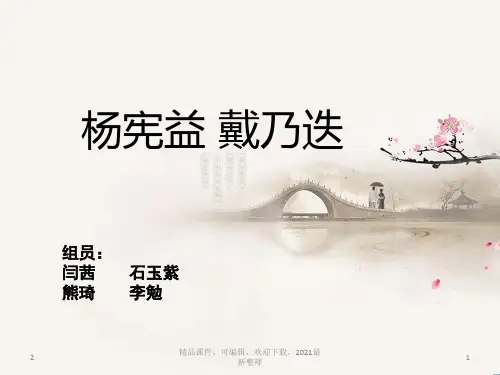
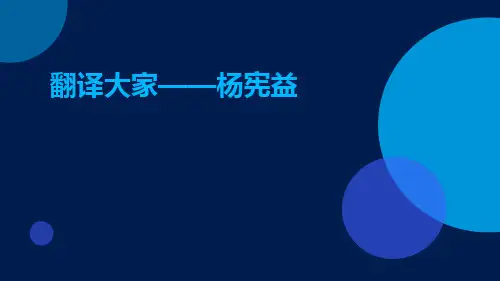
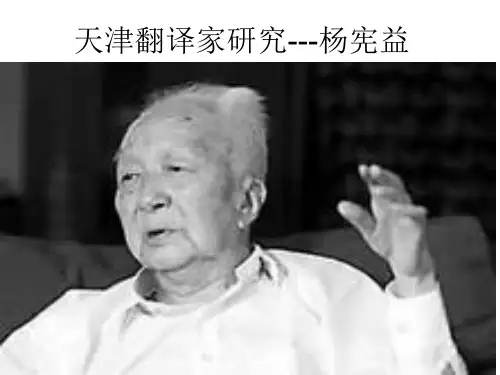
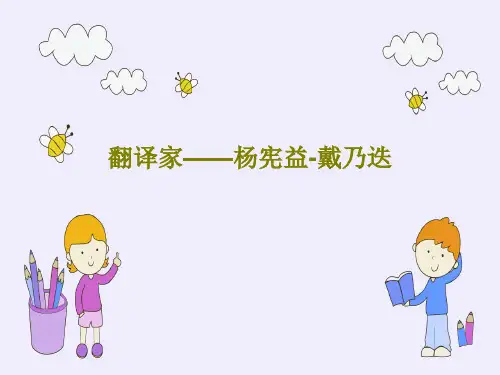
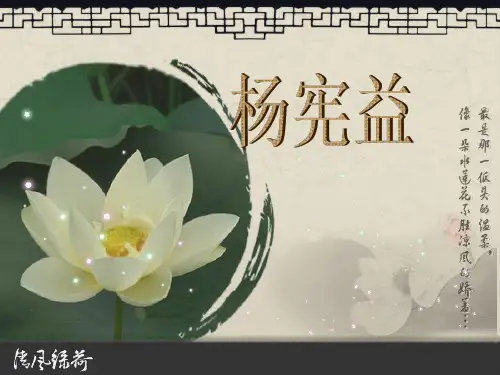
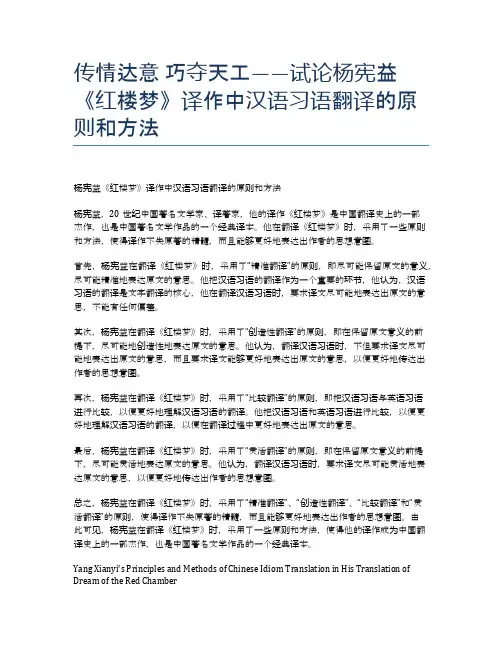
传情达意巧夺天工——试论杨宪益《红楼梦》译作中汉语习语翻译的原则和方法杨宪益《红楼梦》译作中汉语习语翻译的原则和方法杨宪益,20世纪中国著名文学家、译著家,他的译作《红楼梦》是中国翻译史上的一部杰作,也是中国著名文学作品的一个经典译本。
他在翻译《红楼梦》时,采用了一些原则和方法,使得译作不失原著的精髓,而且能够更好地表达出作者的思想意图。
首先,杨宪益在翻译《红楼梦》时,采用了“精准翻译”的原则,即尽可能保留原文的意义,尽可能精准地表达原文的意思。
他把汉语习语的翻译作为一个重要的环节,他认为,汉语习语的翻译是文字翻译的核心,他在翻译汉语习语时,要求译文尽可能地表达出原文的意思,不能有任何偏差。
其次,杨宪益在翻译《红楼梦》时,采用了“创造性翻译”的原则,即在保留原文意义的前提下,尽可能地创造性地表达原文的意思。
他认为,翻译汉语习语时,不但要求译文尽可能地表达出原文的意思,而且要求译文能够更好地表达出原文的意思,以便更好地传达出作者的思想意图。
再次,杨宪益在翻译《红楼梦》时,采用了“比较翻译”的原则,即把汉语习语与英语习语进行比较,以便更好地理解汉语习语的翻译。
他把汉语习语和英语习语进行比较,以便更好地理解汉语习语的翻译,以便在翻译过程中更好地表达出原文的意思。
最后,杨宪益在翻译《红楼梦》时,采用了“灵活翻译”的原则,即在保留原文意义的前提下,尽可能灵活地表达原文的意思。
他认为,翻译汉语习语时,要求译文尽可能灵活地表达原文的意思,以便更好地传达出作者的思想意图。
总之,杨宪益在翻译《红楼梦》时,采用了“精准翻译”、“创造性翻译”、“比较翻译”和“灵活翻译”的原则,使得译作不失原著的精髓,而且能够更好地表达出作者的思想意图。
由此可见,杨宪益在翻译《红楼梦》时,采用了一些原则和方法,使得他的译作成为中国翻译史上的一部杰作,也是中国著名文学作品的一个经典译本。
Yang Xianyi's Principles and Methods of Chinese Idiom Translation in His Translation of Dream of the Red ChamberYang Xianyi, a famous Chinese writer and translator in the 20th century, is known for his masterpiece translation of Dream of the Red Chamber, a classic version of a famous Chinese literary work. In translating Dream of the Red Chamber, he adopted some principles and methods to make sure that the translation would not lose the essence of the original work and could better express the author's intention.First of all, Yang Xianyi adopted the principle of "accurate translation" in translating Dream of the Red Chamber, that is, to preserve the original meaning as much as possible and to express the original meaning as accurately as possible. He regarded the translation of Chinese idioms as an important link. He believed that the translation of Chinese idioms was the core of textual translation, and he required that the translation should be as close to the original as possible and there should be no deviation.Secondly, Yang Xianyi adopted the principle of "creative translation" in translating Dream of the Red Chamber, that is, to preserve the original meaning while expressing the original meaning as creatively as possible. He believed that when translating Chinese idioms, not only should the translation be as close to the original as possible, but also the translation should be able to better express the original meaning, so as to better convey the author's intention.Thirdly, Yang Xianyi adopted the principle of "comparative translation" in translating Dream of the Red Chamber, that is, to compare Chinese idioms with English idioms in order to better understand the translation of Chinese idioms. He compared Chinese idioms with English idioms in order to better understand the translation of Chinese idioms and to better express the original meaning in the translation process.Finally, Yang Xianyi adopted the principle of "flexible translation" in translating Dream of the Red Chamber, that is, to preserve the original meaning while expressing the original meaning as flexibly as possible. He believed that when translating Chinese idioms, the translation should be as flexible as possible to better convey the author's intention.In conclusion, Yang Xianyi adopted the principles of "accurate translation", "creative translation", "comparative translation" and "flexible translation" in translating Dream of the Red Chamber, making sure that the translation would not lose the essence of the original work and could better express the author's intention. It can be seen that Yang Xianyi adopted some principles and methods in translating Dream of the Red Chamber, making his translation a masterpiece in the history of Chinese translation and a classic version of a famous Chinese literary work.。
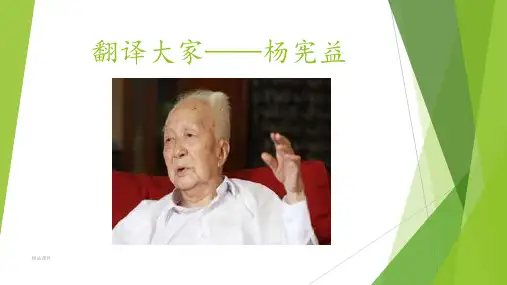
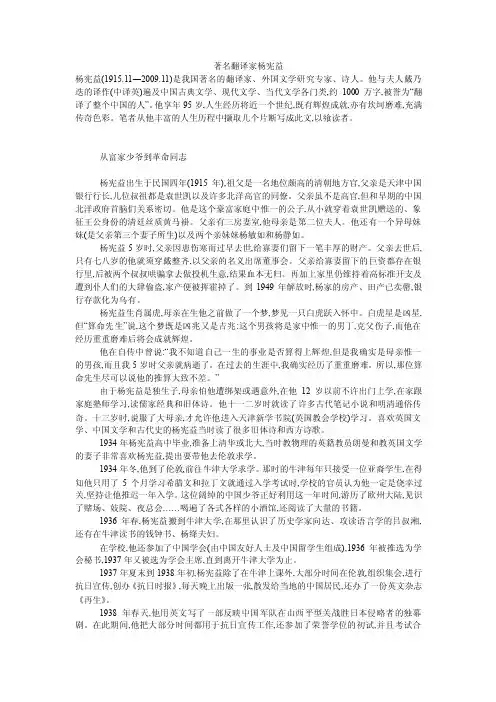
著名翻译家杨宪益杨宪益(1915.11―2009.11)是我国著名的翻译家、外国文学研究专家、诗人。
他与夫人戴乃迭的译作(中译英)遍及中国古典文学、现代文学、当代文学各门类,约1000万字,被誉为“翻译了整个中国的人”。
他享年95岁,人生经历将近一个世纪,既有辉煌成就,亦有坎坷磨难,充满传奇色彩。
笔者从他丰富的人生历程中撷取几个片断写成此文,以飨读者。
从富家少爷到革命同志杨宪益出生于民国四年(1915年),祖父是一名地位颇高的清朝地方官,父亲是天津中国银行行长,几位叔祖都是袁世凯以及许多北洋高官的同僚。
父亲虽不是高官,但和早期的中国北洋政府首脑们关系密切。
他是这个豪富家庭中惟一的公子,从小就穿着袁世凯赠送的、象征王公身份的清廷丝质黄马褂。
父亲有三房妻室,他母亲是第二位夫人。
他还有一个异母妹妹(是父亲第三个妻子所生)以及两个亲妹妹杨敏如和杨静如。
杨宪益5岁时,父亲因患伤寒而过早去世,给寡妻们留下一笔丰厚的财产。
父亲去世后,只有七八岁的他就须穿戴整齐,以父亲的名义出席董事会。
父亲给寡妻留下的巨资都存在银行里,后被两个叔叔哄骗拿去做投机生意,结果血本无归。
再加上家里仍维持着高标准开支及遭到仆人们的大肆偷盗,家产便被挥霍掉了。
到1949年解放时,杨家的房产、田产已卖罄,银行存款化为乌有。
杨宪益生肖属虎,母亲在生他之前做了一个梦,梦见一只白虎跃入怀中。
白虎星是凶星,但“算命先生”说,这个梦既是凶兆又是吉兆:这个男孩将是家中惟一的男丁,克父伤子,而他在经历重重磨难后将会成就辉煌。
他在自传中曾说:“我不知道自己一生的事业是否算得上辉煌,但是我确实是母亲惟一的男孩,而且我5岁时父亲就病逝了。
在过去的生涯中,我确实经历了重重磨难。
所以,那位算命先生尽可以说他的推算大致不差。
”由于杨宪益是独生子,母亲怕他遭绑架或遇意外,在他12岁以前不许出门上学,在家跟家庭塾师学习,读儒家经典和旧体诗。
他十一二岁时就读了许多古代笔记小说和明清通俗传奇。
